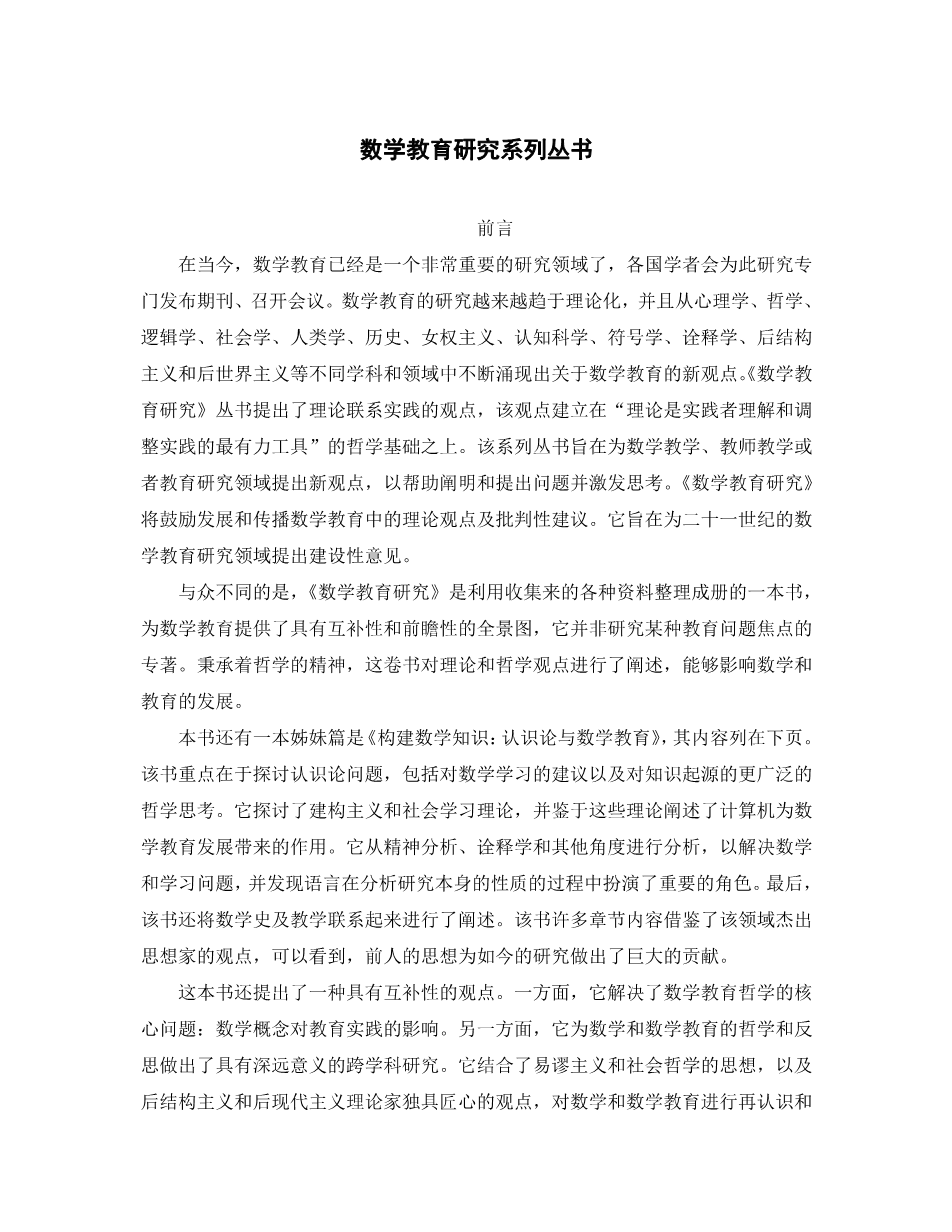Preface by Series Editor
Mathematics education is established worldwide as a major area of study, with numerous dedicated journals and conferences serving national and international communities of scholars. Research in mathematics education is becoming more theoretically orientated.Vigorous new perspectives are pervading it from disciplines and fields as diverse as psychology, philosophy, logic, sociology, anthropology, history, feminism, cognitive science, semiotics, hermeneutics, post-structuralism and post-modernism. The series Studies in Mathematics Education consists of research contributions to the field based on disciplined perspectives that link theory with practice. It is founded on the philosophy that theory is the practitionerrsquo;s most powerful tool in understanding and changing practice. Whether the practice is mathematics teaching, teacher education, or educational research, the series intends to offer new perspectives to assist in clarifying and posing problems and to stimulate debate. The series Studies in Mathematics Education will encourage the development and dissemination of theoretical perspectives in mathematics education as well as their critical scrutiny. It aims to have a major impact on the development of mathematics education as a field of study into the twenty-first century.
Unusually for the series this book and its companion volume are edited collections.Instead of the sharply focused concerns of a research monograph the books offer a panorama of complementary and forward looking perspectives. In the spirit of the seriesrsquo; philosophy, the two volumes illustrate between them the breadth of theoretical and philosophical perspectives that can fruitfully be brought to bear on mathematics and education.
The companion to the present volume is Constructing Mathematical Knowledge: Epistemology and Mathematics Education,and its contents are listed overleaf. Its emphasis is on epistemological issues, encompassing multiple perspectives on the learning of mathematics, as well as broader philosophical reflections on the genesis of knowledge. It explores constructivist and social theories of learning, and discusses the role of the computer in the light of these theories. It brings new analyses from psychoanalysis, Hermeneutics and other perspectives to bear on the issues of mathematics and learning. It enquires into the nature of enquiry itself, and an important emergent theme is the role of language. Finally, it relates the history of mathematics to its teaching and learning. Many of the chapters are from leading thinkers in the field, and the result is a definitive contribution to current debate.
The present volume provides a complementary focus. On the one hand, it addresses the central problem of the philosophy of mathematics education: the impact of conceptions of mathematics on educational practice. On the other hand, it embodies a far-reaching interdisciplinary enquiry into philosophical and reflective aspects of mathematics and mathematics education. It combines fallibilist and social philosophies of mathematics with exciting new analyses from poststructuralist and post-modernist theorists, offering both a reconceptualization and a critique of mathematics and mathematics education. The outcome is a set of new perspectives which bring out the human face of mathematics, as well as acknowledging its social responsibility.
Between them, the two volumes set a research agenda for the philosophy of mathematics education, a rapidly developing area of enquiry. Together they survey research and indicate orientations for future work from some of the best known and exciting young researchers in the field. Future volumes in the series will build upon and consolidate some of the perspectives offered by contributors here.
Paul Ernest
University of Exeter
School of Education,
March 1994
Introduction
Paul Ernest
All mathematical pedagogy, even if scarcely coherent, rests on a philosophy of mathematics. (Reneacute; Thom )
In one short sentence Reneacute; Thom articulates the rationale of this book. It is a contribution to the philosophy of mathematics education, that loosely defined cluster of interests at the intersection of mathematics, education and philosophy; whence the title of this volume.This focus represents an attitude of mind, the desire to enquire into philosophical and reflective aspects of mathematics and mathematics education, and to bring the two together. It also embodies the move towards interdisciplinarity that is sweeping the social sciences and humanities, driven by the desire to break down barriers between disparate fields of knowledge, and to apply some of the exciting new methods and perspectives from one field of study to another.
Central to the philosophy of mathematics eduction are two problems. First, there is of course the problem of the nature of mathematics itself. Second, as the quote by Thom suggests, there is the question of how a philosophy affects the teaching and learning of mathematics. Traditionally the first problem belongs to the philosophy of mathematics.But this field is changing, reflecting a new interdisciplinarity. The philosophy of mathematics might be said to be in the midst of arsquo;Kuhnian revolutionrsquo;. The Euclidean paradigm of mathematics as an objective, absolute, incorrigible and rigidly hierarchical body of knowledge is increasingly under question. One reason is that the foundations of mathematics are not as secure as was claimed. Technical results such as Gouml;delrsquo;s theorems have shown that formal axiomatic systems can never be regarded as ultimate. Another reason is a growing dissatisfaction amongst mathematicians, philosophers,educators and multidisciplinary scholars with the traditional narrow focus of the professional philosophy of mathematics
剩余内容已隐藏,支付完成后下载完整资料


英语译文共 8 页,剩余内容已隐藏,支付完成后下载完整资料
资料编号:[406030],资料为PDF文档或Word文档,PDF文档可免费转换为Word


